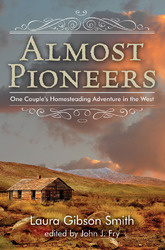In an era of interstate highways, convenience stores, and cell phones, it’s hard to imagine what life must have been like 100 years ago for a couple of young Iowa teachers as they got off a train in the high, grassy plains of Wyoming, armed with a few pieces of luggage—and the determination to make a new life as homesteaders.
With aims of filing a claim on unsettled land, the husband and wife duo contended with the forces of nature—rattlesnakes underfoot, coyotes slinking in the distance, severe winds constantly redistributing dust and sand—to identify a suitable parcel and build a shanty before winter presented a new set of challenges.
“So we planned and dreamed,” the woman wrote later in life, “a couple of small, bewildered fish in an ocean of grass.”

Thanks to University of Iowa alumnus John J. Fry, we now have a vivid picture of the day-to-day trials and tribulations of those two bewildered fish, Laura and Earle Smith, after they moved from Moravia, Iowa, in 1913 to Wyoming’s rural countryside. Fry, a Pennsylvania native, came upon Laura Smith’s journals when he was researching his dissertation in history at the Iowa Women’s Archives in the UI’s Main Library. The typewritten work was a polished piece of narrative prose that had been one of the archives’ first acquisitions in 1992.
“I laughed as I read it. It’s funny and vivid,” says Fry, who earned a Ph.D. from Iowa in 2002. “It made me think about the West in new ways. We often envision the West as full of rugged pioneers, people who go out and know what they are doing. Laura depicts herself as really pretty clueless. She doesn’t know how to garden or make bread, and Earle almost froze to death one day.”

Fry, now chair of the history department at Trinity Christian College in Palos Hills, Ill., was so intrigued by the manuscript that he sought and received permission to publish it. He added footnotes and photos as well as a preface and an afterword, and in 2013 Almost Pioneers: One Couple’s Homesteading Adventure in the West by Laura Gibson Smith was published by TwoDot books, an imprint of Globe Pequot Press.
Smith’s account, Fry says, presents an important perspective on the American West.
“There were people, like the Smiths, who went out West and didn’t stay, who got land as an investment. And by providing a woman’s voice, Laura enriches our understanding of women’s experiences. It’s a pretty American story—it’s about people willing to go backward to go forward,” says Fry, who has used the memoir to spur discussion in his history classes.
“Laura’s story makes for good reflection now—what would you give up to make a better life for yourself?—but it also touches on the dark side of American history. The Smiths were taking land that had been cleared of Native Americans by the U.S. government. History is always more complex than what is depicted in historical films or politics.”
Telling the stories of Iowa women
While researching in the Iowa Women’s Archives for his dissertation in history, John J. Fry (Ph.D. ’02) became captivated by the typewritten memoir of a young Iowa woman who homesteaded to Wyoming in 1913.
The Iowa Women’s Archives was founded in 1992 by Louise Noun and Mary Louise Smith, two prominent Des Moines women who envisioned a space where history would be told through women’s words. The shelves now brim with 1,100 collections of photos, letters, oral histories, scrapbooks, and diaries that illuminate Iowa women’s lives and work.
Located on the third floor of the UI Main Library, the archives is free and open to the public. Unable to visit? Transcribe a diary on DIY History, follow the archives on Tumblr, or check out its blog. To learn more about the archives, click here.
Fry, who grew up on a farm an hour north of Pittsburgh, earned a Bachelor of Arts in history and a master’s degree in library science, both from Pennsylvania institutions, and worked as a librarian for four years before pursuing further academic work in history. From the eight schools he contacted regarding doctoral study, Iowa commanded his attention with what Fry describes as “the most gracious letter,” written by the now-retired professor who would become his cherished adviser, Malcolm Rohrbough.
“One of the things I love most about teaching is talking with my students about ideas and getting them excited about history,” he says. “History is more than dates and names. It’s about what things were like and what we can learn from them.”
Fry’s next project will be a book about the work of writer Laura Ingalls Wilder, whose Little House series is based on her experiences as a pioneer. In fact, it was his affinity for Wilder’s books that inspired the focus of his dissertation—Midwest farmers and what they were reading at the turn of the century—and ultimately led him to the Iowa Women’s Archives and Laura Smith.
“Fewer people are reading Wilder's books now than 40 or 50 years ago,” he says. “They’re wonderful sources for several looks at the West—from Wisconsin to the Great Plains to the Dakotas. They’re well written and engaging. So I hope to make the case for why we should read the Little House books.”
To learn more about Laura Gibson Smith, check out the Almost Pioneers website as well as the Iowa Women’s Archives’ collection guide to her papers.